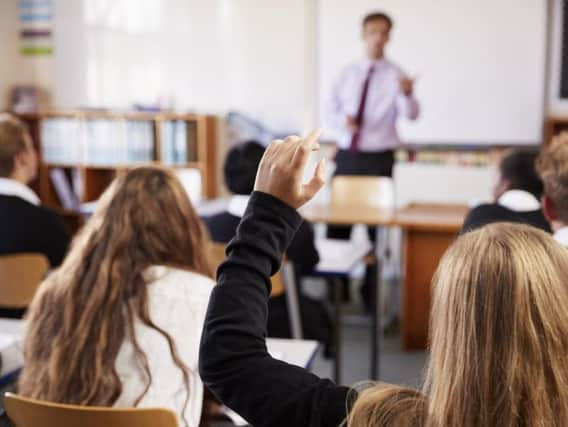Scrapped school surveys won't be reinstated despite concerns about education data


Education Secretary John Swinney said the government's own model of testing attainment at schools was "comprehensive" after he was challenged by MSPs on "a lack of data" which was claimed to be affecting education policy.
In a statement to the Scottish Parliament Mr Swinney said the PISA results, published last week, and the government's own curriculum for excellence statistics published today, were "positive" and showed that "Scotland is moving in the correct direction."
Advertisement
Hide AdAdvertisement
Hide AdHowever Liz Smith, Scottish Conservative education spokesperson, said a quarter of young people were leaving school failing to reach the expected levels in literacy and numeracy, and Scotland is "free-falling" down the international league tables.
She demanded Mr Swinney explain why he was "so convinced we have better school attainment data than we've ever had before as that's an opinion completely at odds with the view of Scotland's educational experts, including the Commission on School Reform which says the data set is the poorest since the 1950s?"
Ms Smith said that a lack of data was leading to the undermining of effective policy making and asked Mr Swinney to accept the recommendations of the Commission - a think tank organisation - that Scotland should rejoin the International Mathematics and Science Survey and the Progress in International Reading Literacy Study as well as reintroduce its own domestic sample survey of performance in key curricular areas during the phase of broad general education.
But Mr Swinney said: "We participate in the PISA exercise and we intend to continue to participate in that survey. The problem with sample surveys, like the Scottish Survey on Literacy and Numeracy, is that when there's an issue to be confronted - as there was in 2015 - the sample survey does not tell us where the problems lies, it tells us generically there's an issue, but not where the problem lies, and I'm interested in solving where the problems lie.
"What the data we now have available to us, assembled pupil by pupil from every single school in the country, gives us a picture of what is the performance, and you can look at relative performance of local authority area versus local authority area, that local variation we need to confront as a country to ensure that the educational needs of young people are being met."
He added: "That flows into the national improvement framework data which sets out the various measures which we look at, which we consulted upon, which I thought we'd reach some broad agreement about as being the measures that had to be looked at to assess the closure of the poverty-related attainment gap, so I firmly believe we have a comprehensive data set available to judge the progress of Scottish education."
The government's International Council of Education Advisers, Mr Swinney said, had advised that "incremental gains" were needed to ensure sustainable improvement, and pointed to a one percentage point rise in overall primary literacy and secondary numeracy as an example, though the PISA results "showed that we have more progress to make in maths."
However today's government statistics showed a persistent deprivation-related gap, with a gulf of 19.2 points in literacy attainment between primary one children from the most and the least deprived areas; rising to 21.5 points in primary four and remaining at that level through to primary seven. In numeracy the gap starts at 13 points, growing to 18.3 points in primary four and then 19.3 in primary seven.
Advertisement
Hide AdAdvertisement
Hide Ad"Attainment among the most disadvantaged children and young people rose in numeracy at all stages, and in reading and writing at P1, P4 and P7. The attainment gap between the most and the least disadvantaged has narrowed on most indicators. For example, the gap in P1 literacy has closed by one percentage point – it is almost two percentage points for P7 literacy."
Ms Smith said the figures proved the SNP’s record on education was "woeful.“ She added: "In addition, despite SNP promises, teacher numbers are still 2,853 fewer than they were when the SNP came to power.
“This is simply unacceptable especially when the current pupil cohort is rising and when there is a squeeze on subject choice options in secondary schools. The SNP’s inability to halt the decline in our educational standards is letting children down and will have long term repercussions for our economy."
And Scottish Labour's education spokesperson, Iain Gray, said: “Another day and another example of the SNP’s mismanagement of education. The SNP used to say education was their top priority – however, the continual existence of a large attainment gap for literacy and numeracy, as well as Scotland’s disappointing PISA results, should lay that idea to rest.
“Rather than carrying on with needless and unwanted reforms, and ignoring the views of teachers, parents and educationalists, John Swinney should start listening to those who really know what’s going on.
“The SNP must face up to the facts and do all they can to sort out the state of education in Scotland. If they fail to do so the parents of Scotland will give the SNP failing marks at the ballot box.”
